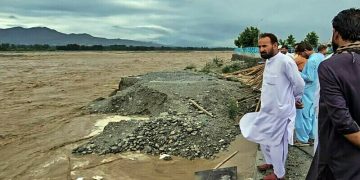Pakistan is an agricultural country with a significant portion of its population engaged in farming. The agriculture sector is a crucial contributor to the country’s economy, accounting for around 20% of its GDP. However, the sector faces several challenges, including water scarcity, soil degradation, climate change, and lack of modernization. To address these challenges, Pakistan is gradually trying to adopt smart agriculture practices, which involve using advanced technologies to optimize crop production and increase efficiency smart agriculture is an emerging field that involves the use of advanced technologies to optimize crop production and increase efficiency.
In Pakistan, where agriculture is a crucial contributor to the economy and employs over 40% of the workforce, the adoption of smart agriculture practices can have a significant impact on food security issues and the country’s economy. One of the main ways in which smart agriculture contributes to food security issues in Pakistan is by increasing crop yields. Smart agriculture technologies such as precision farming, drone-based crop monitoring, and automated irrigation systems can help farmers optimize their crop yields by providing them with accurate data on soil conditions, water usage, and nutrient needs. This can help farmers make informed decisions about how to manage their crops, leading to higher yields and increased food production. In addition to increasing crop yields, smart agriculture can also improve the quality of crops produced in Pakistan. By using advanced technologies to monitor crop health and detect issues such as pests and diseases, farmers can produce high-quality crops that meet market demands. This can increase the value of agricultural products and contribute to the growth of Pakistan’s economy.
Another way in which smart agriculture can contribute to Pakistan’s economy is by reducing costs. Smart agriculture technologies can help farmers optimize the use of inputs such as water, fertilizer, and pesticides, reducing the amount of waste and increasing efficiency. This can make farming more profitable and increase the economic viability of agriculture sector in Pakistan. Smart agriculture can also improve climate resilience in Pakistan. Climate change is a significant threat to food security in Pakistan, as it can lead to crop failures and reduced yields. Smart agriculture practices such as conservation agriculture, crop diversification, and agroforestry can help farmers adapt to the changing climate conditions by improving soil health, conserving water, and reducing greenhouse gas emissions. This can improve the resilience of agriculture sector to climate change and contribute to food security in Pakistan. Another, the adoption of smart agriculture technologies can create new employment opportunities in Pakistan. By investing in areas such as data analytics, drone operation, and precision farming, Pakistan can create new jobs that require advanced skills and education. This can help improve the economic prospects of the country and contribute to its overall development. Although the smart agriculture can help farmers to improve the crop yield owing to farmer’s livelihood and solve the food security issues.
However, there are several reasons why Pakistani farmers do not adopt smart agriculture. The main reason is lake of awareness, if we look at ground situation many farmers are not aware about the benefits of the smart agriculture technologies, and how to use them effectively. This can be due to lake of education and training opportunities, as well as limited access to information and communication technologies. If the Pakistani government builds platforms where farmers benefited with education about the benefits of smart agriculture and its use for improving agriculture productivity can help to overcome this problem. Another problem for the farmers is not to use smart agriculture is high cost of production. The adoption of smart agriculture technologies are very expensive to acquire and maintain, which may make it difficult for small-scale farmers to afford them. This can limit their ability to adopt these technologies and benefit from their use. To overcome this barrier, the government and private sector can provide financial incentives such as subsidies, loans, and grants to help farmers invest in smart agriculture technologies.
In ground reality small-scale farmers in Pakistan often struggle to obtain loans or credit to invest in their farms. It is time taking process and reduces the motivation of the farmers to adopt smart agriculture technologies and improve their crop yields. Therefore, it is necessary for government and microfinance banks to make a plate form where farmers can get the credits in an easy way. The lake of infrastructure is another reason why the farmers do not adopt smart agriculture technologies. For the adoption of smart agriculture technologies requires access to reliable power, and internet connectivity. Many rural areas in Pakistan lack these amenities, which make it difficult for farmers to adopt these technologies. In order to solve this problem the Pakistani government should invest in infrastructure such as rural electrification and broadband connectivity. Additional, some farmers are resistant to change and they prefer to go with traditional methods because they are very familiar with them, it make difficult to diverse from traditional methods to modern agriculture. Thus, encouraging farmers to switch to modern agriculture is compulsory because it will not only help to improve farmers’ livelihood, but also contribute in food security issue, and economic growth of the nation.
In overall, smart agriculture has the potential to significantly contribute to food security issues and Pakistan’s economy. By increasing crop yields, improving crop quality, reducing costs, improving climate resilience, and creating new employment opportunities, smart agriculture can improve the livelihoods of farmers and contribute to the growth and development of Pakistan’s economy. To fully realize these benefits, however, Pakistan must invest in education and training for farmers, improve access to finance, and invest in infrastructure such as rural electrification and broadband connectivity.






























